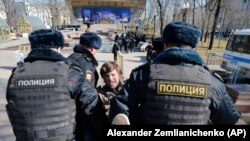Svetlana Petrenko, acting director of public relations for the Russian Investigative Committee says that her agency has information that demonstrators were promised cash rewards if they were detained for taking part in nationwide March 26 demonstrations after the airing of fresh allegations of corruption directed against Prime Minister Dmitry Medvedev by the Anti-Corruption Fund founded by lawyer Alexey Navalny.
At least 1500 Russians -- many of whom were young people -- were detained in connection with the March 26 demonstrations in some 100 cities.
While there is no evidence that Navalny or other organizers of the march offered people cash compensation, the government’s charges may be based on a post Navalny made on his blog before the rally on March 22, and another post that appeared on his blog March 27 after Navalny himself was already in jail.
In his March 22 post, Navalny said he hadn't expected so many people to commit to turning out for the rallies. He noted that authorities often would deny a permit to demonstrate, but activists intended to march anyway. He gave supporters advice if they were detained for taking part in unsanctioned rallies. "So I answer you: if you are detained, then you will still earn cash." The March 27 post reiterated this claim, but explained that each person detained would first have have to appeal his or her case at a local and a superior court.
Navalny then pledged that he would appeal to the European Court of Human Rights (ECHR) on behalf of each and every person detained who failed after their two appeals. He noted that he himself had filed appeals to the ECHR, and cited the ECHR ruling in his favor,which he said involved "rather large sums" (a total of the ruble equivalent of 50,000 euros for moral damage, 1,025 euros for material damage and 12,653 euros for court costs from the Russian government). Navalny added that if he had to make thousands of such complaints he would, enlisting his fund's lawyers and others from human rights groups.
The ECHR has indeed made rulings on behalf of Russian plaintiffs that involve compensation, small and large. In some cases, the Russian government has indeed made these payments to the individuals involved. Other times, Russia has ignored ECHR rulings that demand compensation be paid. One notable refusal involved a favorable ruling for YUKOS, the energy company founded by former political prisoner Mikhail Khodorkovsky.
In 2015, Russia declared it will no longer recognize the primacy of international law (and hence ECHR rulings), so it is not clear what can be expected if Navalny files mass numbers of complaints.
There are other obstacles as well. The process to file a case at the ECHR can be difficult and time-consuming. There is no guarantee that the ECHR will accept hundreds of such cases from Navalny and his colleagues, nor rule that compensation should be given, although it has in some low-profile cases, such as one regarding a demonstrator at the May 12, 2012 demonstration on Bolotnaya Square.
RBC, the Russian wire service, interviewed a number of participants in the March 26 action to determine if they were promised cash. One young demonstrator, age 15, whose name was provided as Yekaterina A., said, "It's total nonsense that someone offered money. Nothing was promised to either me or my friends." Another demonstrator, also age 15, Yekaterina S., said, "I didn't receive any money...We just expected an answer from the government but I didn't get answers -- now we're Navalny's militants." A third boy, named Ilya, age 17, said "There were five of us, but no one heard that supposedly they promised money in the event of detention."
Navalny was jailed for 15 days for marching without a permit and faces the prospect of serving suspended sentences from criminal cases that he says were fabricated by authorities to punish him for his activism.
The claim that Navalny has to pay cash to demonstrators is in part a projection of the government's own practice of paying pro-Kremlin demonstrators but is also consistent with a campaign to discredit Navalny and others exposing government corruption by making it appear as if they themselves are corrupt.
Medvedev himself said on April 4 that Navalny's allegations were "garbage" and paid for by "private investors."





